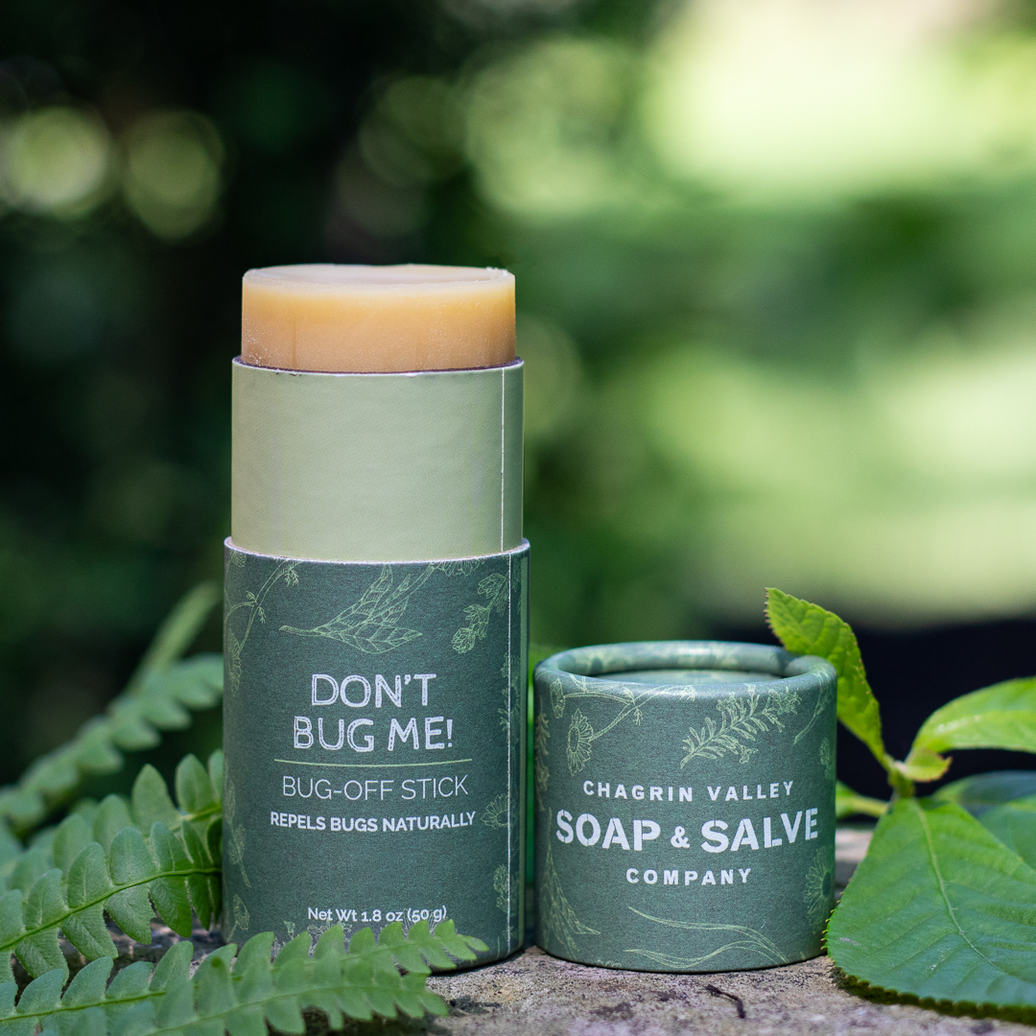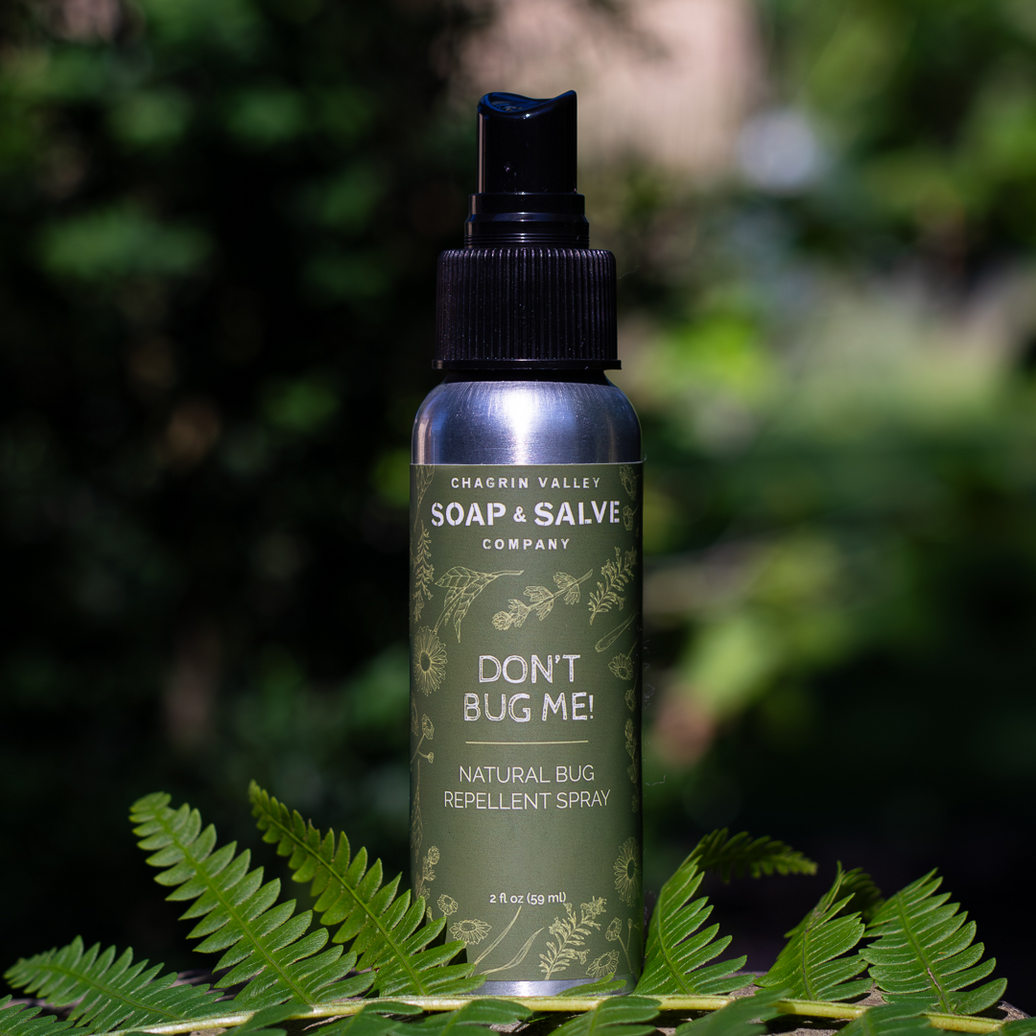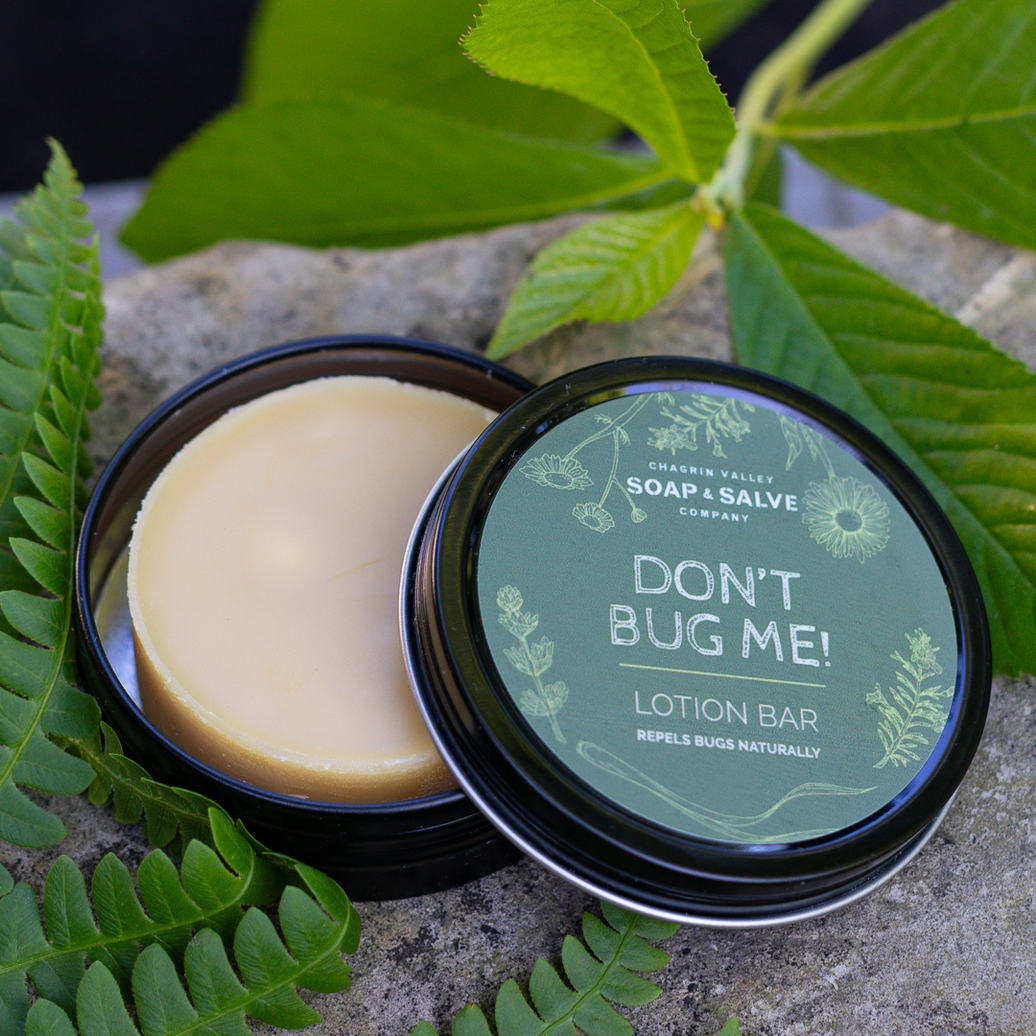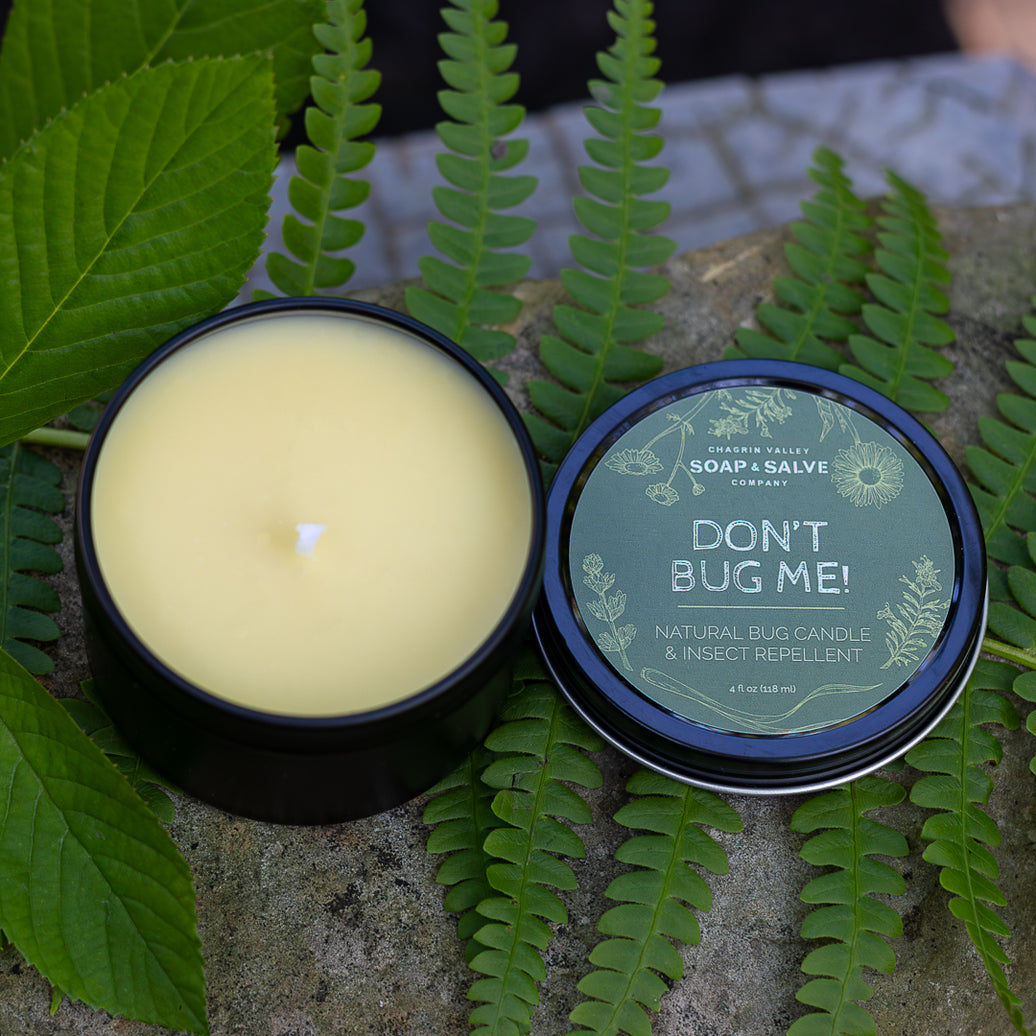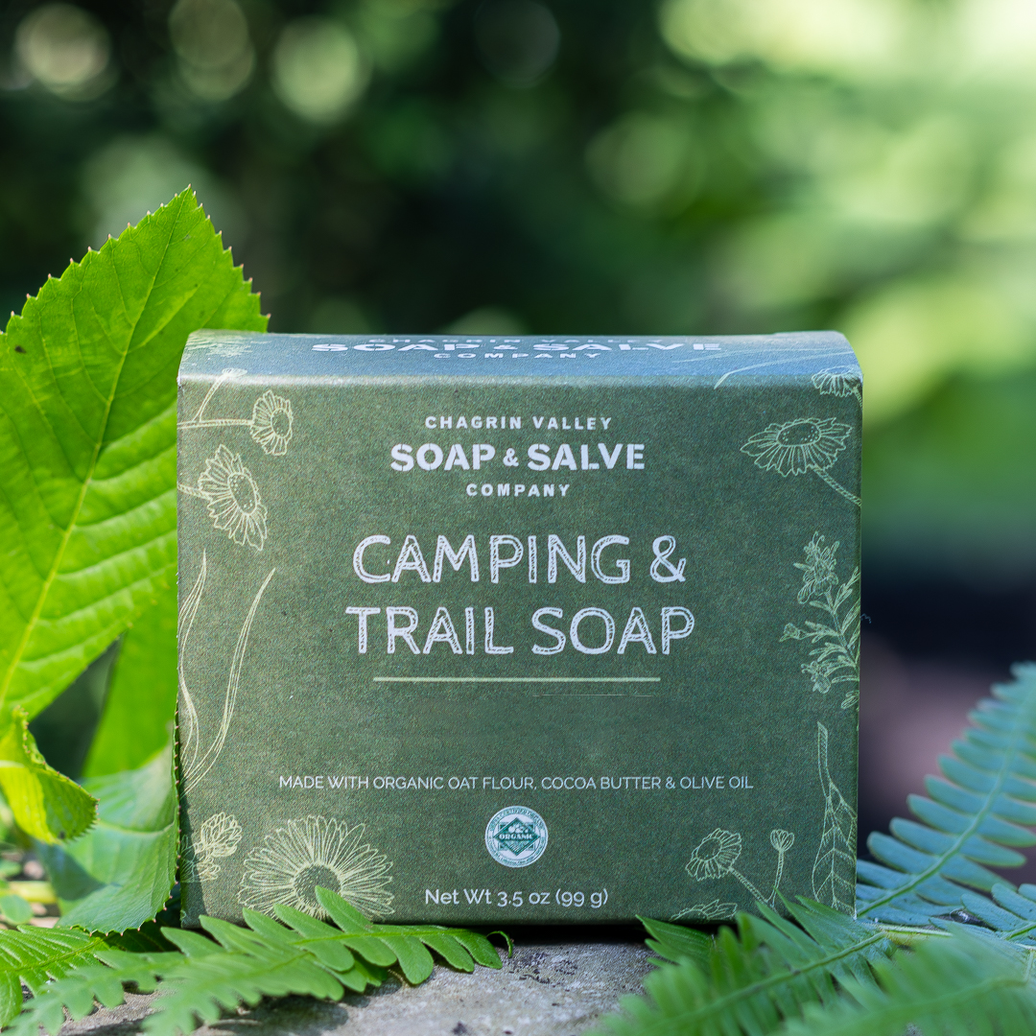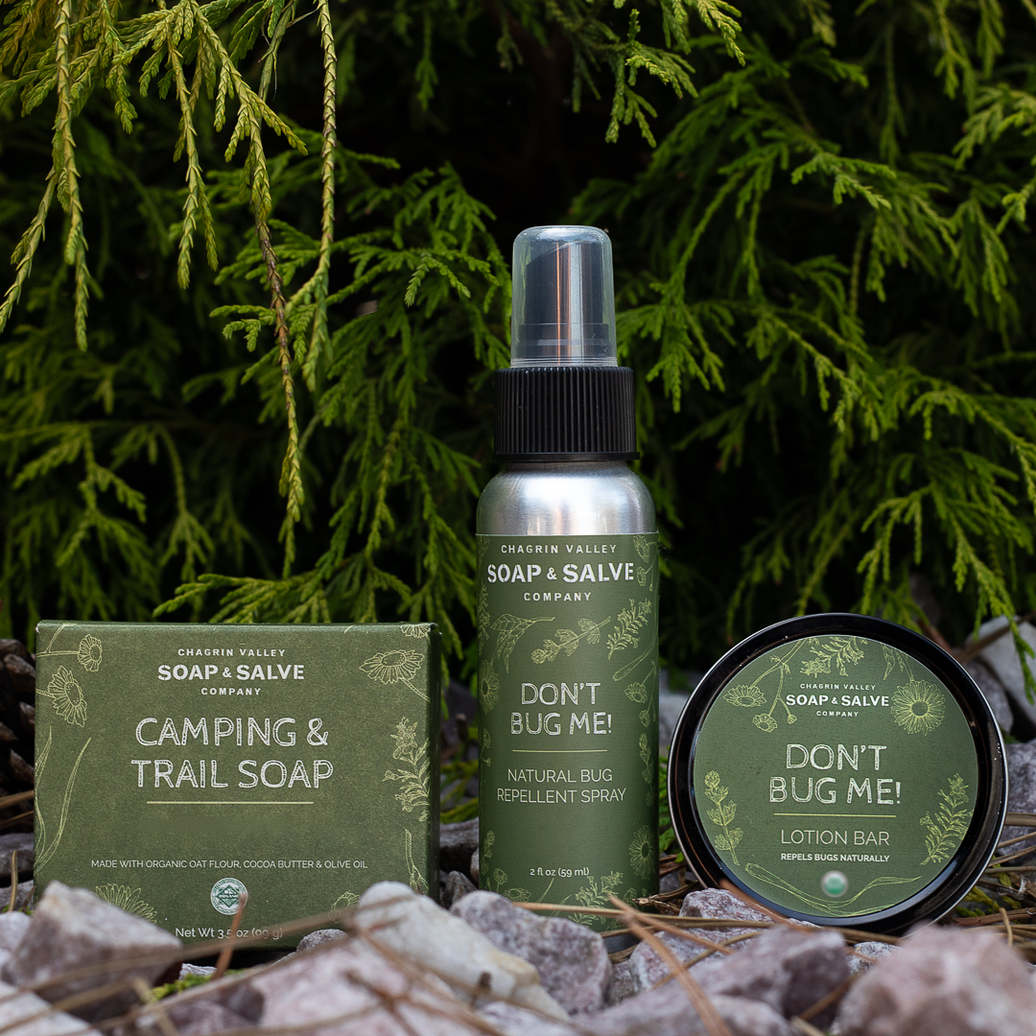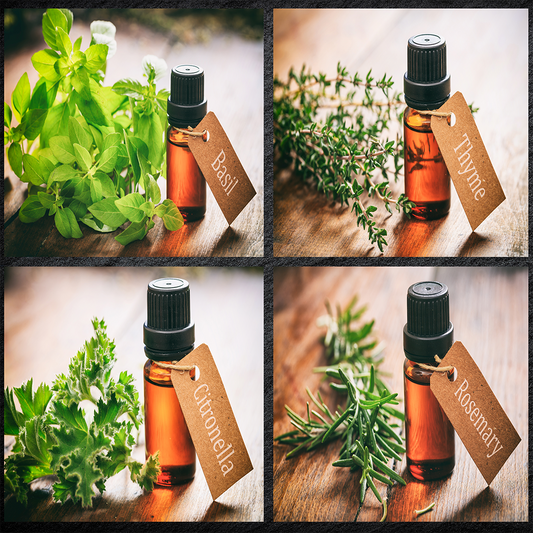Natural Bug Repellent & Mosquitoes
Here in Northeastern Ohio our spring weather is turning warm. It is the time we begin to enjoy backyard barbecues, nature walks, gardening and more outdoor adventures. It is also a time when mosquitoes and other pesky bugs begin to thrive.

Your local mosquito population depends on temperature and rainfall. While April showers bring beautiful May flowers, they also bring lots of puddles and standing water in which mosquitoes lay their eggs.
The entire life cycle for these uninvited biting guests is about 8-10 days at room temperature. Warmer temperatures increase the rate at which they mature.
So, very warm weather with lots of warm surface water means a large mosquito population.
The mosquito life cycle begins when the adult female lays her eggs on the surface of standing water. The pupal and larval stages take place in the water until finally the adult mosquito emerges to fly off, find food, mate, and begin the process all over again.
Male mosquitoes have feathery antennae they use to locate females. After mating, females typically seek a blood meal, that means you, to aid in egg production.
Mosquito bites can be more than just itchy and annoying. Although most types of mosquitoes are just a nuisance, some in the United States and around the world spread viruses that can cause severe disease.
The whole idea behind the ingredients in an insect repellent is to make us unappealing to bugs. Since my skin is very sensitive to synthetic chemicals, I have never been able to use conventional bug repellents.
The irritation from the repellent is more of a problem for me than the itching from bug bites. That being said, I don’t live in an area where bug bites usually lead to serious diseases. For low-risk environments and backyard enjoyment, natural bug and insect repellents, when applied correctly, can work well.
What Attracts Mosquitoes to Humans?
My husband and I love spending warm summer evenings outside. Unfortunately within a few hours I may have one or two mosquito bites, he will have many, many more. He is definitely a mosquito magnet.

Have you ever wondered why some people seem irresistible to mosquitoes while others are not? There is actually scientifically-backed evidence to explain.
Mosquito bites come solely from females, who rely on the protein in human blood for egg production. However, according to the National Institutes of Health the female does not arbitrarily land on things and hope she can feed. It turns out that her neural circuitry for choosing her next victim is quite sophisticated and not completely understood.
There are studies that seem to point to three main things the female mosquito uses to find just the right victim, scent, heat receptors, and vision.
There are many things involved in our "human scent" that Mosquitoes use to detect a nearby host. Mosquitoes use exhaled carbon dioxide as a long-range detector. Lactic acid has also been shown to be a significant mosquito attractant and is much more prevalent in humans than in other animals. Humans emit scent from other compounds that also aids in the mosquito hunt.
According to Meg Younger, a Boston University College of Arts & Sciences assistant professor of biology, who studies mosquito olfaction:
“Mosquitoes are highly specialized. These relentless, buzzing creatures are designed to find us, bite us, use proteins in our blood to reproduce—and repeat. The mosquitoes’ sense of smell is highly attuned to humans."
The unconventional way mosquitoes process odors may help explain why they are so good at finding their human treats. Their sophisticated olfactory (sense of smell) system can sense the carbon dioxide we exhale from long distances. This means your metabolic rate, or the amount of CO2 your body releases as it burns energy, is a big factor when it comes to attracting mosquitoes. Since larger people often exhale more, they are often more likely to receive bites.
Mosquitoes also love pregnant women. There has not been a lot of research on this topic, but a study published in Lancet in 2000 states “Pregnant women attracted twice the number of the predominant African malaria-carrying mosquito—than did their non-pregnant counterparts.”
Pregnant women on average have higher metabolic rates than non-pregnant women. One study found that they exhale 21% more CO2 than their non-pregnant counterparts. Pregnant women also tend to have warmer body temperatures, another mosquito attractor.
Since mosquitoes are attracted to carbon dioxide exhaled, lactic acid produced, and increased body heat, we are also more susceptible to mosquito bites during or after exercise.
 There have been some studies demonstrating that the unique microbiome of each person's skin may play a critical role in helping mosquitoes find their next tasty treat.
There have been some studies demonstrating that the unique microbiome of each person's skin may play a critical role in helping mosquitoes find their next tasty treat.
Our natural body odor caused by the breakdown of the natural bacteria on our skin, is part of our natural make-up and unique for each person. Although it is not necessarily an odor that we humans can detect, it is another invitation to dinner for a female mosquito.
Once a mosquito has caught on to our scent, she will then use her vision to help find her human target.
There is also some research to indicate that additional factors may also play a role in an individual's attractiveness to mosquitoes, such as blood type, body chemistry, clothing color, what you drink, and what you eat. Who knows what else scientist will discover as the research continues.
What Is Natural Insect Repellent?
At Chagrin Valley our Natural Bug Repellents embody our motto, "Harnessing the Power & Simplicity of Nature®."
Our Don’t Bug Me insect repellents, a bug spray, two lotion bars, a candle, and even a soap, use the power of plants to help minimize insects bites.
Obviously, the whole idea behind the ingredients in an insect repellent is to make us less appealing to bugs. Since plants have been producing compounds to protect themselves from pests since the beginning of time, these plant-derived ingredients can also help protect humans.
There is clinical research showing that you can minimize bug bites with a combination of the natural repellent compounds found in plant essential oils.
How Do Natural Insect Repellents Work?

The natural insect repellents in plants are found in the essential oils naturally contained in the leaves, stems, bark, wood, and flowers.
Many of these oils have sophisticated insect deterrent properties that we can use to our advantage
Pests like mosquitoes have very different biological systems than mammals. Our Certified Organic bug repellents work because the active ingredients are plant essential oils known to contain high levels of natural bug deterrents.
Above I mentioned that one of the major ways that mosquitoes hunt is by scent. Essential oils are volatile molecules. As the volatile compounds in essential oils evaporate from the skin and are released into the air around you, they help mask your natural scent, give off a scent that mosquitoes do not like, and interfere with the insect's sense of smell or taste making it difficult for them to locate food (that's you).
Since the repellent properties of a natural insect repellent are based on scent and essential oils tend to evaporate quickly, they do not last as long as a product containing DEET (chemical name, N,N-diethyl-meta-toluamide). While a DEET repellent, which also works by interfering mosquito’s sense of smell, can provide protection for 5 or more hours, those with essential oils as active ingredients, provide about 2 hours protection. Therefore, they must be applied more frequently.
Read our blog to learn more: Natural Insect Repellents: The Power Of Plants
Areas At High Risk for Bug-borne Diseases
As you read about our natural bug repellents, please note that if you are looking for long-lasting protection in severe conditions, such as venturing into areas that are heavily infested with mosquitoes and ticks that carry disease, like Malaria or the Zika virus, DEET is still recommended as the most effective.
The CDC website has numerous pages of information concerning insect-borne diseases, the most effective insect repellents, and travel precautions.
How to Use Natural Bug Repellents from Chagrin Valley
When used safely and applied properly, natural essential oil repellents can help deter insects from biting. We have five types of natural bug repellent.
 Our Don't Bug Me Bug-Off Stick and Lotion Bar are portable solids that you can apply to the skin as often as required paying special attention to places that bugs like to bite you.
Our Don't Bug Me Bug-Off Stick and Lotion Bar are portable solids that you can apply to the skin as often as required paying special attention to places that bugs like to bite you.
Our Natural Bug Spray is a non oily organic repellent that can be lightly sprayed onto all areas of exposed skin.
Our Insect Repellent Candle is a bug candle and natural body insect repellent all in one! You can enjoy the scent that helps deter mosquitoes and then apply the warm lotion to exposed skin where bugs are biting.
Our Camping & Trail Bar is a natural soap formulated with essential oils known to discourage mosquitoes and other insects. It is not only a soap, but can be used as shampoo bar and can be rubbed on exposed skin as you hike along. A great all-purpose camping soap.
If you want to make you own natural bug repellent with essential oils, there are plenty of DIY recipes online. Be sure to research the safety and efficacy of each oil and ALWAYS properly dilute essential oils in a carrier oil or other base in which they will dissolve.
Other Things to Help Decrease Mosquitoes
Remove Standing Water

Getting rid of standing water around the yard is one of the best ways to help control mosquitoes where you live. Mosquitoes need water to survive and breed.
Female mosquitoes lay their eggs in standing water and the young mosquitoes live in the water for at least a week before they begin to fly.
- Remove items that collect rainwater that you don’t need, like old tires
- Change the water in bird baths at least once a week
- Clean clogged gutters to allow rainfall to drain freely
- Check old tires, tarps on woodpiles, drainage ditches, and anything that catches rainwater after a storm
Though eliminating standing water will not guarantee that you will never get mosquito bites, it will help make these occurrences less frequent.
Plant an Pollinator or Herb Garden OR Make Herbal Insect Repellent Smoke Bundles
Keeping with our theme of the "power of plants" there are some plants that may help deter pesky bugs.
Check out our blog "Bug Repellent Plants & Smoke Bundles" which describes some bug-deterring plants, how to use them in your garden, and how to create herbal smoke bundles to help discourage annoying mosquitoes.
Conclusion
As with all of our products, I feel great about our ingredients. Our “Don’t Bug Me!” products feel great on your skin, are 100% natural, USDA Certified Organic, and can be used by the whole family.
The concentration of essential oils is stronger in our natural bug repellents than in other skincare products. While they are still at skin-safe levels, for very young children or those with very sensitive skin we recommend an allergy patch test before using.
Keep in mind that a natural insect repellent will need to be applied more often than conventional repellents.
If you are concerned about avoiding serious insect-borne disease from mosquitoes and ticks and you are in an area with high infestation it may be best to use DEET for longer-term protection. But for low-risk environments and backyard enjoyment, natural repellents, when applied correctly, can work well.
Have you ever used a Natural Bug Repellent? Do you have any special tips for staying bug-bite-free during the Summer months?
